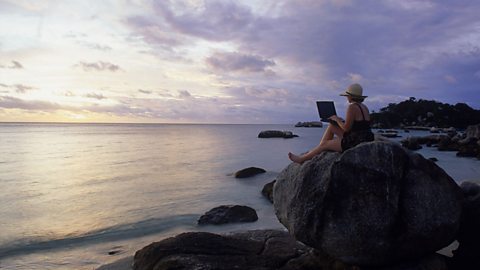Travel writing

Travel writing tells the reader about visiting different places.
A tourist guide - or a more personal account of a journey - will:
- describe places
- inform about cultures
- explain how to do things
They might also:
- persuade the reader to visit
- advise the reader what to do
- entertain the reader with a creative style of writing
Guides are usually written in the third person whereas personal accounts tend to be first person.
Travel writing can take many forms, such as newspaper articles, essays, journals, blogs and autobiography. It can also be written as a book, telling a longer narrative about a journey or place. Many types of travel writing contain the features of literary non-fiction.
Example
Bill Bryson is a famous travel writer. This extract is the opening paragraph from his book The Lost Continent (1989).
I come from Des Moines. Somebody had to.
When you come from Des Moines you either accept the fact without question and settle down with a local girl named Bobbi and get a job at the Firestone factory and live there forever and ever, or you spend your adolescence moaning at length about what a dump it is and how you can't wait to get out, and then you settle down with a local girl named Bobbi and get a job at the Firestone factory and live there forever and ever.
The Lost Continent, Bill Bryson
Analysis
In this extract:
- Bryson begins with humour, âSomebody had to.â This amuses the reader and creates a chatty tone. It raises the question âWhy does he sound negative?â â intriguing the reader.
- Using the first personThe 'I' or 'we' used by a narrator who is a participant in a narrative, in contrast to the third person - 'he', 'she' or 'they' - of a narrator who is not directly involved. forms an immediate connection between Bryson and his reader. He builds on this by opening with an anecdoteA short amusing or interesting story about a real incident or person. to entertain them.
- A rule of three summarises âyourâ future, âsettle down with a local girlâ, âget a job at the Firestone factoryâ and âlive there forever and everâ. This makes life in Des Moines sound predictable and limited.
- The contrasting options âaccept the fact without questionâ or âspend your adolescence moaning at lengthâ are both awful!
- Describing Des Moines as a âdumpâ makes the reader imagine a rubbish dump or an ugly place.
- Bryson ends the extract with a repetition of your first âoptionâ - to âsettle, get a job and live there forever and everâ â this implies that you have no choice really and cannot escape Des Moines.
- This extract is likely to entertain the reader but unlikely to persuade them to visit Des Moines!